dilemma: Difference between revisions
Περὶ τοῦ ἐπέκεινα τοῦ νοῦ κατὰ μὲν νόησιν πολλὰ λέγεται, θεωρεῖται δὲ ἀνοησίᾳ κρείττονι νοήσεως → On the subject of that which is beyond intellect, many statements are made on the basis of intellection, but it may be immediately cognised only by means of a non-intellection superior to intellection
m (Text replacement - "}}]]" to "}}]]") |
m (Text replacement - "(|thumb)\n(\|link=)" to "$1$2") |
||
| Line 1: | Line 1: | ||
{{Woodhouse1 | {{Woodhouse1 | ||
|Text=[[File:woodhouse_224.jpg|thumb | |Text=[[File:woodhouse_224.jpg|thumb|link={{filepath:woodhouse_224.jpg}}]]'''subs.''' | ||
|link={{filepath:woodhouse_224.jpg}}]]'''subs.''' | |||
P. and V. [[ἀπορία]], ἡ. | P. and V. [[ἀπορία]], ἡ. | ||
Revision as of 17:07, 18 May 2020
English > Greek (Woodhouse)
subs.
P. and V. ἀπορία, ἡ.
Be in a dilemma, v.: P. and V. ἀπορεῖν, V. ἀμηχανεῖν (rare P.).
Latin > English (Lewis & Short)
dĭlemma: ătis, n. (δίλημμα),
I a double proposition, a dilemma; in logic, an argument in which an adversary is pinned between two difficulties, Serv. Verg. A. 2, 675, and 10, 449.
Latin > French (Gaffiot 2016)
dĭlēmma, ătis, n. (δίλημμα), dilemme [sorte d’argument] : Serv. En. 10, 449.
Latin > German (Georges)
dilēmma, atis, n. (δίλημμα), der Doppelsatz, eine Schlußart in der Logik, die so von zwei Seiten faßt und zwischen zwei Sätze so einklemmt, daß man notgedrungen sich nach einer Seite hin ergeben (einem von beiden Sätzen beipflichten) muß, Serv. Verg. Aen. 2, 675 u. 10, 449.

